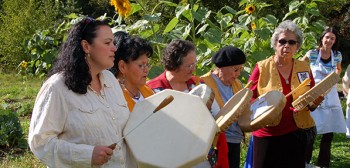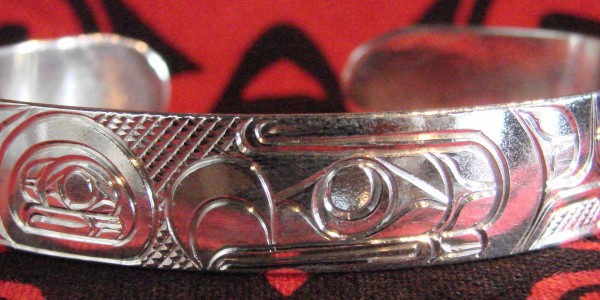Share your story: Deadline June 11
To celebrate National Aboriginal Day (June 21) Vancouver Coastal Health co-hosting a cultural awareness event for staff, holding a prize draw and more. Watch for more information in VCH News.
Enter the draw
Share your story about culturally appropriate care in the comment section below, and you’ll be entered into a draw for one these prizes:
- Grand prize: A $100 gift certificate for Cedar Root Gallery located at the Aboriginal Friendship Centre at 1607 E. Hastings St. Vancouver.
- Second prize: One of five $20 Starbucks gift cards.
TIPS: Share your culturally appropriate care story in a few sentences. Leave out information that could be used to identify clients. Focus on the part of the experience that demonstrates the importance of culturally competent care and service. If you’ve taken the Indigenous Cultural Competency training, how did it help? Did your experience change how you see the role of culturally competent care in your work?
Mark your calendar
Your’e invited to attend a day of Aboriginal Cultural Awareness, co-hosted by the Musqueam Nation, VCH, First Nations Health Authority and PHSA. Enjoy complimentary lunch, a tour and entertainment featuring artist from the Red Jam Slam Society. Shuttle service will be available–check back for details.
Wednesday June 17, 2o15
10:30 a.m. to 5 p.m.
Musqueam Cultural Centre, Musqueam Nation
4000 Musqueam Ave. Vancouver Map
Please RSVP to Loreen.smith@vch.ca by June 11.
Stay tuned
Check VCH News for more details on the June 17 event program.



Georgina Reid
I am First Nations, born and raised in Bella bella and have been employed at the hospital for the past 33yrs.
I love my job and it is the LTC clients who keep me working. I bring in cultural music for soem of the clients to listen to and for a few of the clients, this brings back memories to them of when they were young and how they were rooted by their grand parents, this pulls on my heart strings because the culture wasn’t there when I was a young one and I am ever grateful for my position I hold.
Cynthia Hamilton
Marlane Christensen says
My Organizational Leadership Project is a natural extension of the Indigenous Cultural Competency training that VCH staffers are encouraged to take. I am looking forward to the caregiver focus groups where VCH and Tla’amin Health caregivers currently working with Tla’amin Elders are going to sit at the same table to share their experiences and challenges to close the gap in service – or process of transition to residential care.
I encourage you to include my project if you feel that it is a good example of the shift in defining, together, cultural competency and safety.
Jason Luey
I am not of First Nations descent but often work with clients who are. I remember one First Nations Elder who was frail, medically complicated and frequently hospitalized. The hospital treatment (and occasionally, absence of treatment) towards her and her family disclosed to me was quite disappointing to hear. I realize that it could have been true or not. Nonetheless, their experiences only activated me to be an even stronger, better advocate for them to navigate our complex health care system.
No need to enter me in the draw, either.
I believe to practice culturally competent care for First Nations community (and really, for any other community), I urge one to genuinely learn about their history, their past and how it would pertains to health care. Thanks for listening.
Jennifer Beckrud
My association with First Nations has nothing to do with my 28 year career at Vancouver General. I am off to hike the West Coast Trail again next week and have many friends now that live and work in the area of the hike. They are always friendly and have many stories of the area. As a guest of their community I take care not to disturb their artifacts and burial sites. They respect me and take me to areas most tourists do not see.
I have recently met a young person who is a case worker for aboriginal people in our hospital and am impressed such a position exists. I hope this is part of a trend that will continue into the future.
Linda Feng
As part of a facility case conference, family and or main contacts and the residents are included along with the facility care team and community supports. Usually one or two contacts are involved. But since it was important to have the band and many members of the extended family included to provide relevant history re: residential school survivor, long time alcohol abuser, but wonderful caring person; everyone was able to plan and agree with the best care, best placement and in the best interest of the resident. Everyone including the resident are happy with the outcome.
Josephine Jung
I have taken the Indigenous Cultural Competency training and it was eye opening. After taking the course, I had a better understanding of the history, terminology and other cultural dimensions of Aboriginal People that I can apply to my work. The training also helps support our organization’s strategic focus on patient/family/resident centered care. As a planner, taking into account our key populations that we serve and their unique history and culture is paramount to when understanding current services and planning for future needs.
Michael Pasche
I don’t have one specific story, but would like to share my learning experiences and how they have shaped my practice. I was very fortunate to have a Cree elder as an instructor during a residency in Spiritual Care a few years ago. I came from a background of almost no awareness of aboriginal culture, and this learning opportunity opened my eyes to relating with and supporting Aboriginal patients in their own spiritual beliefs and practices. I encourage them to use the Sacred Space at VGH for smuding and prayers, and also offer the services of the Aboriginal Patient Navigators for further cultural and spiritual support.
Don Strom
In 1993 I helped to run one of the local homeless shelters. The Blue Jays were in the World Series and they were playing the Atlanta Braves. A large group of people were watching the game with me and I was shocked to see that the Atlanta fans sang a chant while waving foam tomahawks up and down. Finally one of the guys in the audience stood up and said “What the f*** is this sh**? We ended up turning down the sound on the game and had a great group discussion about sterotypes in the media and sports teams with derogatory names and how everyone felt about this.
Linda Harris
I have taken the Indigenous Cultural Competency training basic level and the next level for Psychiatry, in my opinion these courses should be mandatory for all staff to complete. At times co-workers have made comments that were not culterally respectful and I do ask them if they have taken the training, and how much do they know about Residential Schools and the damage caused. I have observed the staff most resistant to compassion are of a religous background. Perhaps that creates a barrier between their personal beliefs and the fear of respecting spiritual beliefs so different from what they believe to be true.
In our Hospital when a patient that is Aboriginal is close to passing on, the family and friends come to the room and perform appropriate ceremony for that persons journey. The drumming and singing has been appreciated by many staff and other patients, but complained about by some as well. I believe it is critical we continue to provide this space for the family and patient to complete this very sacred ceremony.
I appreciate the great efforts VCH is making to educate and create a deeper understanding for staff to connect respectfully and appropriately with all our patients, and co-workers.
All my relations in healing. A’ho
Kathy Gerry
I don’t need to be entered into the draw, I’d just like to share one of my stories because striving to providing culturally appropriate compassionate care is an every day goal for my practice.
A patient came into the ED one busy evening after having a couple of days of nausea and vomiting. They had been unable to take their daily oral medications for chronic pain, so as well as feeling ill, they were in terrible pain and suffering. The patient lay down on a stretcher so I could start an IV and administer some gravol and pain medication. Quietly, the patient began to cry. I asked if they wanted to talk about what they were feeling. The patient paused then told me that it was a particularly difficult time in their life because they had recently participated in the Truth and Reconciliation Commission in their home town. This had stirred many feelings and memories of residential school and the impact it had on their life. I listened and then said I had been learning more about the the residential school system and its legacy. I told her that I was very sorry for what they had been put through and that it was terrible injustice. I sat with the patient for a brief moment and provided a warm blanket. After a time, the patient became more comfortable and was discharged from ED.